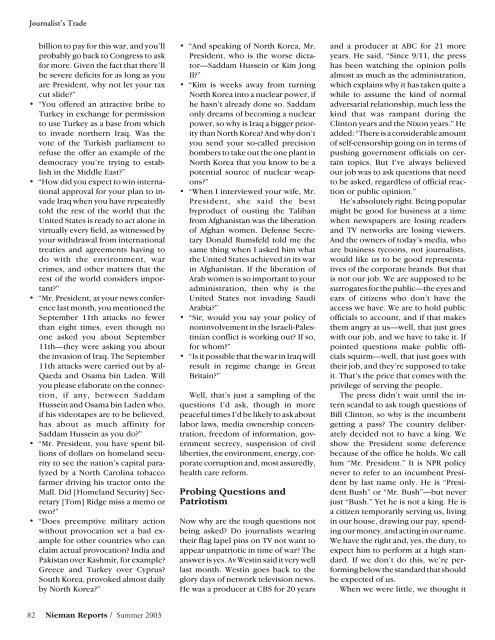summer-2003-Part 2-live - Nieman Foundation - Harvard University
summer-2003-Part 2-live - Nieman Foundation - Harvard University
summer-2003-Part 2-live - Nieman Foundation - Harvard University
- No tags were found...
Create successful ePaper yourself
Turn your PDF publications into a flip-book with our unique Google optimized e-Paper software.
Journalist’s Tradebillion to pay for this war, and you’llprobably go back to Congress to askfor more. Given the fact that there’llbe severe deficits for as long as youare President, why not let your taxcut slide?”• “You offered an attractive bribe toTurkey in exchange for permissionto use Turkey as a base from whichto invade northern Iraq. Was thevote of the Turkish parliament torefuse the offer an example of thedemocracy you’re trying to establishin the Middle East?”• “How did you expect to win internationalapproval for your plan to invadeIraq when you have repeatedlytold the rest of the world that theUnited States is ready to act alone invirtually every field, as witnessed byyour withdrawal from internationaltreaties and agreements having todo with the environment, warcrimes, and other matters that therest of the world considers important?”• “Mr. President, at your news conferencelast month, you mentioned theSeptember 11th attacks no fewerthan eight times, even though noone asked you about September11th—they were asking you aboutthe invasion of Iraq. The September11th attacks were carried out by al-Qaeda and Osama bin Laden. Willyou please elaborate on the connection,if any, between SaddamHussein and Osama bin Laden who,if his videotapes are to be believed,has about as much affinity forSaddam Hussein as you do?”• “Mr. President, you have spent billionsof dollars on homeland securityto see the nation’s capital paralyzedby a North Carolina tobaccofarmer driving his tractor onto theMall. Did [Homeland Security] Secretary[Tom] Ridge miss a memo ortwo?”• “Does preemptive military actionwithout provocation set a bad examplefor other countries who canclaim actual provocation? India andPakistan over Kashmir, for example?Greece and Turkey over Cyprus?South Korea, provoked almost dailyby North Korea?”• “And speaking of North Korea, Mr.President, who is the worse dictator—SaddamHussein or Kim JongIl?”• “Kim is weeks away from turningNorth Korea into a nuclear power, ifhe hasn’t already done so. Saddamonly dreams of becoming a nuclearpower, so why is Iraq a bigger prioritythan North Korea? And why don’tyou send your so-called precisionbombers to take out the one plant inNorth Korea that you know to be apotential source of nuclear weapons?”• “When I interviewed your wife, Mr.President, she said the bestbyproduct of ousting the Talibanfrom Afghanistan was the liberationof Afghan women. Defense SecretaryDonald Rumsfeld told me thesame thing when I asked him whatthe United States achieved in its warin Afghanistan. If the liberation ofArab women is so important to youradministration, then why is theUnited States not invading SaudiArabia?”• “Sir, would you say your policy ofnoninvolvement in the Israeli-Palestinianconflict is working out? If so,for whom?”• “Is it possible that the war in Iraq willresult in regime change in GreatBritain?”Well, that’s just a sampling of thequestions I’d ask, though in morepeaceful times I’d be likely to ask aboutlabor laws, media ownership concentration,freedom of information, governmentsecrecy, suspension of civilliberties, the environment, energy, corporatecorruption and, most assuredly,health care reform.Probing Questions andPatriotismNow why are the tough questions notbeing asked? Do journalists wearingtheir flag lapel pins on TV not want toappear unpatriotic in time of war? Theanswer is yes. Av Westin said it very welllast month. Westin goes back to theglory days of network television news.He was a producer at CBS for 20 yearsand a producer at ABC for 21 moreyears. He said, “Since 9/11, the presshas been watching the opinion pollsalmost as much as the administration,which explains why it has taken quite awhile to assume the kind of normaladversarial relationship, much less thekind that was rampant during theClinton years and the Nixon years.” Headded: “There is a considerable amountof self-censorship going on in terms ofpushing government officials on certaintopics. But I’ve always believedour job was to ask questions that needto be asked, regardless of official reactionor public opinion.”He’s absolutely right. Being popularmight be good for business at a timewhen newspapers are losing readersand TV networks are losing viewers.And the owners of today’s media, whoare business tycoons, not journalists,would like us to be good representativesof the corporate brands. But thatis not our job. We are supposed to besurrogates for the public—the eyes andears of citizens who don’t have theaccess we have. We are to hold publicofficials to account, and if that makesthem angry at us—well, that just goeswith our job, and we have to take it. Ifpointed questions make public officialssquirm—well, that just goes withtheir job, and they’re supposed to takeit. That’s the price that comes with theprivilege of serving the people.The press didn’t wait until the internscandal to ask tough questions ofBill Clinton, so why is the incumbentgetting a pass? The country deliberatelydecided not to have a king. Weshow the President some deferencebecause of the office he holds. We callhim “Mr. President.” It is NPR policynever to refer to an incumbent Presidentby last name only. He is “PresidentBush” or “Mr. Bush”—but neverjust “Bush.” Yet he is not a king. He isa citizen temporarily serving us, livingin our house, drawing our pay, spendingour money, and acting in our name.We have the right and, yes, the duty, toexpect him to perform at a high standard.If we don’t do this, we’re performingbelow the standard that shouldbe expected of us.When we were little, we thought it82 <strong>Nieman</strong> Reports / Summer <strong>2003</strong>
















